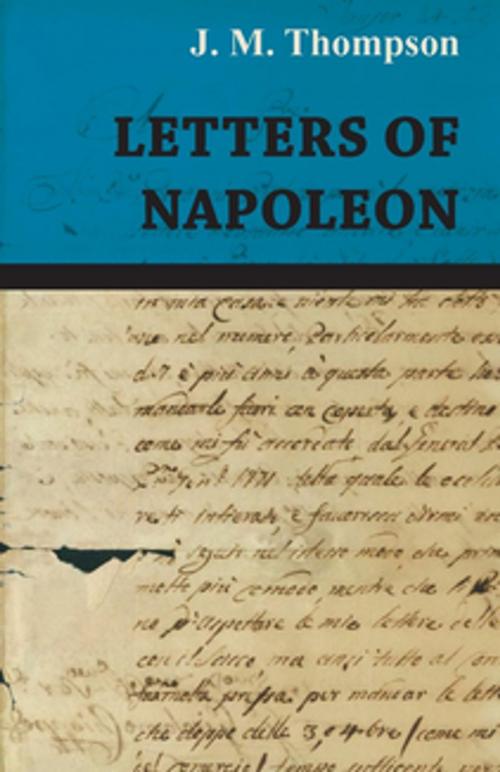| Author: | J. M. Thompson | ISBN: | 9781444659757 |
| Publisher: | Read Books Ltd. | Publication: | April 16, 2013 |
| Imprint: | Obscure Press | Language: | English |
| Author: | J. M. Thompson |
| ISBN: | 9781444659757 |
| Publisher: | Read Books Ltd. |
| Publication: | April 16, 2013 |
| Imprint: | Obscure Press |
| Language: | English |
Not that all Napoleons letters, or even many of them, are of a selfrevealing kind. In youth he had few confidants in middle age he had little to confide. la the stress of business and war he soon shed the idealism of the patriot, the fatalism of the f evolutionary, and the romanticism of the lover. Any sense he may once have had of the beauty, the pathos, or even the humour of life was coarsened by flattery and success. He can still declare, exhort, abuse, persuade, even charm but always in the interest of a policy, and to gain an end. He is wise, clearsighted, eloquent, heroic but hardly ever a human being in repose. Nevertheless, Napo leons letters remain, beyond anything written about him, or anything else he wrote or said about himself, by far his finest portrait. When he was a young man, Napoleon wrote in the rapid and already confused hand of the relatively rare letters signed Buonaparte or Bonaparte. With growing age and work, his handwriting became so slovenly as to be wellnigh illegible whilst his signature shortened from Napoleon to Napol., Nap., Np., and N. Though he still wrote some private letters, and the more important military and diplomatic despatches, he habitually employed secretaries, and carried on the bulk of his correspondence by dictation. Napoleon had three principal secretaries Bourrienne 1797-1802, Meneval 1802-13, and Fain 1806-14. All of them wrote Memoirs, and there is no lack of evidence as to how their work was done. In a rather unkind conversation at St. Helena, Napoleon said that Bourrienne wrote a good hand, and was active, tireless, and patriotic, but that he was a gambler, whose face lit up when his master dictated any thing dealing with big figures: he was in fact dismissed for becoming involved in financial speculation. His work was done partly at the Luxembourg, and partly at the Tuileries. In his Memoirs he describes Napoleons appear ance, dress, and habits in minute detail. From breakfast at 10 to dinner at 5 every hour was taken up with reading petitions, correcting letters, giving interviews, or attending meetings.
Not that all Napoleons letters, or even many of them, are of a selfrevealing kind. In youth he had few confidants in middle age he had little to confide. la the stress of business and war he soon shed the idealism of the patriot, the fatalism of the f evolutionary, and the romanticism of the lover. Any sense he may once have had of the beauty, the pathos, or even the humour of life was coarsened by flattery and success. He can still declare, exhort, abuse, persuade, even charm but always in the interest of a policy, and to gain an end. He is wise, clearsighted, eloquent, heroic but hardly ever a human being in repose. Nevertheless, Napo leons letters remain, beyond anything written about him, or anything else he wrote or said about himself, by far his finest portrait. When he was a young man, Napoleon wrote in the rapid and already confused hand of the relatively rare letters signed Buonaparte or Bonaparte. With growing age and work, his handwriting became so slovenly as to be wellnigh illegible whilst his signature shortened from Napoleon to Napol., Nap., Np., and N. Though he still wrote some private letters, and the more important military and diplomatic despatches, he habitually employed secretaries, and carried on the bulk of his correspondence by dictation. Napoleon had three principal secretaries Bourrienne 1797-1802, Meneval 1802-13, and Fain 1806-14. All of them wrote Memoirs, and there is no lack of evidence as to how their work was done. In a rather unkind conversation at St. Helena, Napoleon said that Bourrienne wrote a good hand, and was active, tireless, and patriotic, but that he was a gambler, whose face lit up when his master dictated any thing dealing with big figures: he was in fact dismissed for becoming involved in financial speculation. His work was done partly at the Luxembourg, and partly at the Tuileries. In his Memoirs he describes Napoleons appear ance, dress, and habits in minute detail. From breakfast at 10 to dinner at 5 every hour was taken up with reading petitions, correcting letters, giving interviews, or attending meetings.















